Contact Form now working
 We apologize to those of you who tried to contact us. The forms appeared to be working, but were not sending the information to our office.
We apologize to those of you who tried to contact us. The forms appeared to be working, but were not sending the information to our office.
This has been corrected.
Workers' Comp Insurance – PEOs

 We apologize to those of you who tried to contact us. The forms appeared to be working, but were not sending the information to our office.
We apologize to those of you who tried to contact us. The forms appeared to be working, but were not sending the information to our office.
This has been corrected.

 This article is an outline of a talk that our CEO gives to various groups. Please contact us if you are interested in such a talk
This article is an outline of a talk that our CEO gives to various groups. Please contact us if you are interested in such a talk
Myth # 7: “I don’t need to be on my payroll – I can take distributions.”
Our CPAs have always advised us that even though Subchapter S corps and LLCs allow “distributions” to owners, the IRS expects you to run a payroll and use those distributions for special or unusual circumstances. A failure to run a payroll regularly can “raise a flag” on your return, which may make you subject to an audit.
Myth # 6: “If I have Workers’ Comp insurance claims don’t affect me.”
While it is true that in most cases the full burden of the claim falls upon the insurance company, it is important to remember that an “experience modifier” follows your corporation or business entity throughout its lifetime. Excessive claims can raise this modifier, which will correspondingly raise your workers’ comp premium.
Myth # 5: “A payroll service will relieve me of the worry of paying payroll taxes.”
Some payroll services, especially PEOs, who legally become the employer of record, can certainly mitigate the liability associated with payroll taxes. With a standard payroll service however, it is your FEIN that goes on the return and hence you will be audited if there is a problem. It is true that a reputable payroll service will “stand by your side” at the audit but you will still have some, if not all, of the responsibility. In a PEO situation the lion’s share of the liability rests with the PEO since it is their FEIN that is on the return.
Myth # 4: “Unemployment Claims do not cost me time or money.”
This gets monitored much the same way workers’ comp claims do. The state will keep a record of your claim history and can adjust your rate up or down on an annual basis. Certainly managing your employees properly and terminating them according to correct procedures will reduce your unemployment rate exposure.
Myth # 3: “We have our posters up so we are in compliance.”
Oh really? How old are those posters? Have you checked with all the state, federal and local authorities? Wouldn’t it be nice to have someone do that for you?
Myth # 2: “I’m exempt from Workers’ Comp because I don’t have enough employees.”
This is a great misunderstanding. NO ONE is exempt from Workers’ Comp in the United States of America. If an employee is injured on the job it falls under the Workers’ Compensation Act and the employer is responsible for all medical, legal, and administrative expenses involved with the claim, as well as paying lost wages from time out of work, typically two-thirds of the normal wage.
In most states, you may apply for an Insurance Exemption, which allows you to be self-insured. This depends on the number of employees. In Florida it is 3 or fewer employees besides the owners, or 1 employee in the construction field. You may be “exempt” from having an insurance policy but you still are subject to workers’ comp.
Myth # 1: “I don’t have employees, all my people are 1099 contractors.”
There is no doubt that many people in a contracting situation legally and are truly 1099 contractors. However, this is one of the most widely abused categories in the employment arena today. The 1099 is meant for those people that are truly independent, NOT just a way to avoid paying taxes.
Myth # .5: “I can do it without professional help.”
Good luck with that 🙂
We hope you will view us as a resource. You probably don’t need our services now, but you want the firetruck to know how to get to your house! Some of you might have even “smelled some smoke” while we were talking …

Spring 2010 Interview with PEO Pros CEO John Will Tenney (by Rick Aguirre)

PEO Payroll Services with PAY-surance HR / PEO Pros
One of the most common “employer headache” complaint heard is handling the complicated and changing world of employee payroll and tax compliance associated with having employees.
“I decided to have PEO Pros find a PEO for me because doing Payroll was so laborious.” says Jeff Bosworth, Orlando area business owner and HR consultant. “It was a constant problem. I’m a firm believer that you pay people for professionalism.” |
Handling payroll and ensuring employee tax compliance is a major benefit of working with a PEO. In addition to ensuring compliance with all taxing agents in the local, state and federal governments, annual tasks such as issuing W-2s are handled professionally. It’s important to remember that a PEO uses their own FEIN and it becomes their responsibility to comply. This is a favorable transfer of liability for business owners.
In addition to representing PEOs, PAY-surance HR also functions as brokes for Administrative Service Organizations (ASOs), more commonly known as Payroll Companies.
Payroll Services are available in three ways:
* From a PEO as a PEO client
* From a “payroll company” as an ASO client
* As a service from a PEO using the ASO model
In all of these cases, PEO Pros has the staff and expertise to find you a feasible solution.
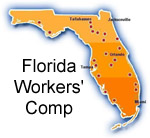
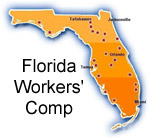
Florida is an “administrative state” which means the state sets the rates for workers comp for each “class code.”
You would think this would mean everybody pays the same for their workers comp insurance.
Not so. There are several modifiers and discounts that can be applied to premium payments.
Written Safety Program Credit
If you have an approved, written safety program the carriers are authorized to give you an overall 2% discount.
“Drug-Free” Workplace Credit
If your workplace employs an approved drug testing program you are eligible for an additional 5% discount on premium.
Stock Company Discount
The state allows Stock Company Carriers (as opposed to Mutual Carriers) to discount premium at larger volumes, in the approx. range of 8 to 14%
Experience Modifier (Mod)
The National Council for Compensation Insurance (ncci.com) is tasked with determining a premium multiplier for companies in various states, including Florida. Everyone starts at 1.0. Should you demonstrate good claims history, you can be assigned a “credit mod” – a number under 1.0. For example a 0.8 mod is basically saying the same thing as a 20% discount. Conversely, a “debit mod” (greater than 1) can be assigned for poor claims history.
Deductible Discounts
In the case of larger clients, a discount can be approved by the state insurance office for a deductible credit. These can start small (say $500) and go all the way up to “high deductible” credits ($1 million for example.)
PEOs often use high deductible policies to share the risk with the carrier for their clients.

 “Rick and John’s Weekend Update” is a video blog done by two business owners here in East Orlando. Today’s guest was noted health expert and insurance agency owner Augie Buffa, of I-surance, LLC.
“Rick and John’s Weekend Update” is a video blog done by two business owners here in East Orlando. Today’s guest was noted health expert and insurance agency owner Augie Buffa, of I-surance, LLC.
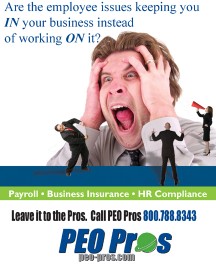
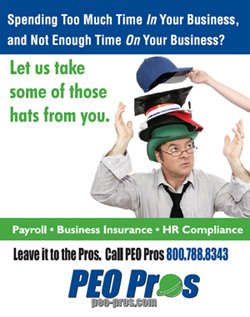
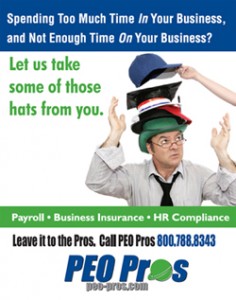 A primary tax that affects business owners is the state unemployment tax assessment (SUTA).
A primary tax that affects business owners is the state unemployment tax assessment (SUTA).
In Florida, a new business is assigned a rate of 2.7%. This rate is charged on the first $7000 of each employee’s annual payroll.
After 10 quarters the business SUTA rate is subject to review, and may increase or decline, based on unemployment claim history.
Many business owners would rather not worry about this tax and instead leave this employer headache to a PEO, who will become the employer of record in a co-employment situation.
In that case, by using a PEO to handle your HR issues, these headaches literally become “Somebody Else’s Problem” – SEP!